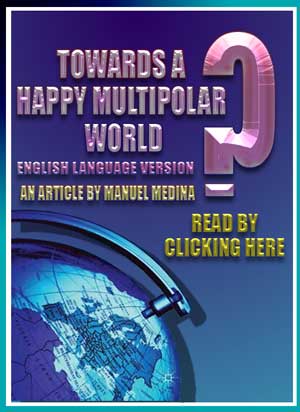
THE EVANESCENT ILLUSION OF A MULTI-POLAR, CAPITALIST, PACIFIST, COOPERATIVE WORLD
It seems that the imaginable ‘multi-polarity’ would do away with both class contradictions and the predatory nature of the capitalist system, according to some of its most outspoken interpreters.
The author of this article, our regular contributor Manuel Medina, shows that just as it has happened -and go on happening- with the long-standing controversy whether capitalism could be embellished using cosmetic ‘reforms’ to making-up its most inhuman and damaging aspects, so the debate on the nature of imperialism has been causing numerous and even sore confrontations over the last century. Medina begins his critical analysis discussing the claim of former Nicaraguan ambassador and professor of International Law in Autonomous University of Madrid, Augusto Zamora, that a multi-polar world “will be a confluent and cooperative world”, where “big countries would have their own areas of influence, but not in an imperialist or neocolonialist sense”.
By MANUEL MEDINA / CANARIAS SEMANAL
Augusto Zamora is a former Nicaraguan ambassador of his country in Spain. He later became a professor of International Public Law in the Autonomous University of Madrid. In various articles and speeches, Zamora has repeatedly said that humanity is leading to:
“A converging and cooperative world” in which “the big countries would have their own areas of influence, but not in the imperialist or neocolonialist sense that US and Europe have historically and currently held”.
Putting in more precise terms his views on the characteristics of the forthcoming world, the former ambassador adds:
“It will be a new model of international society in which influence would not have a negative connotation, but rather one of cooperation and understanding. This would be the one established, for example, between China and India or between Europe and Russia, once the US nightmare gets vanished”.
In Zamora’s view, only from that moment:
“This other world could be developed with different rules and without the US’s current concerns on keeping its hegemony by dint of bombs, threats, coercion and sanctions”.
Contrary to what some might think, the illusions above expressed by this former diplomat in regard to the evolution of present capitalism are not at all new. They are part of a century-long debate that was held within the social-democratic movement following Marx’ death, and that is being renewed today by considerations on the so-called “multi-polarity”.
Just as it has happened -and go on happening- with the long-standing controversy on whether capitalism could be embellished using cosmetic ‘reforms’ to making-up its most inhuman and damaging aspects, so the debate on the nature of imperialism has been causing numerous and even sore confrontations over the last century among those who claim to fight it.
It is, moreover, the case that, in times of defeat as those we are living today, this kind of illusive escapism keeps growing everywhere as if it was a huge soufflé. And it is essential to recognize that there is a very human orientation to obstinately insisting on replacing an unbearable dramatic reality by a hopeful but flimsy house of cards, more to the point in times when there is not even a glimmer of hope of reconstructing revolutionary movements or organizations with a practice drawn on the scientific analyses of surrounding reality.
A LONGSTANDING DEBATE: IS THE EXPANSIONIST AND PREDATORY NATURE OF CAPITALISM MODIFIABLE?
It was in 1916 when the Russian revolutionary Vladimir Lenin wrote his famous book “Imperialism, the Highest Stage of Capitalism”, soon becoming an essential classic work to understand the forces driving he movement and development of capitalist great powers from the 20 th century on.
In this book, Lenin contended -and demonstrated- that imperialism was not the result of the decisions and whims of a particular state or group of states. What he demonstrated is that imperialism was an unavoidable stage of capitalist economic development, its highest stage, the stage of monopolistic capitalism, subsequent to that of competitive capitalism. Lenin saw clearly -and also demonstrated- that the development of financial capitalism would inexorably lead the most economically developed capitalists countries to the exploitation of other peoples and to warfare. In order to corroborate the Russian revolutionary and theorist’s assertion, it should suffice to look around us and verify the movements made in a natural way by the greatest world powers from a certain stage of their economic development onward.
Lenin’s interpretation of the type of evolution that characterized capitalists states reaching a certain development of monopolistic and financial capital produced at once adamant contenders. One of them was the Czech politician and member of the German social- democratic party Karl Kautsky, who claimed that it was possible to replace the imperialist politics of the great powers with politics of a pacifist type. In Kautsky’s view, a new stage of economic development, a kind of “ultra-imperialism”, was probably to come about by which the planet would get divided between a few big monopolies, thus opening up the possibility to establish a “balanced peaceful consensus” among the great contending powers.
The essential difference between Kautsky’s opinions and those of Lenin in regard to imperialism was that, while the former claimed that imperialism was only “a politic” adopted by the monopolistic capital, the latter instead viewed imperialism as an inevitable stage of their development, and only the revolutionary struggle against monopolistic capital might put an end to it along with the imperialist wars that it unavoidably waged. The difference between the two positions was not at all trivial.
Kautsky’s evanescent reformist illusions did not last long though. The first and second World War came to shatter the expectations of a politician whose name and remembrance, by the way, became part of history thanks to Lenin’s book of rebuttal published with the title “The Proletarian Revolution and The Renegade Kautsky”.
The approaches of the former diplomat and professor of International Law in the Autonomous University of Madrid, Augusto Zamora, are thus a repetition of a very old controversy which took place nearly one hundred years ago, although he might not know it.
The unreal possibility of a non imperialist, peaceful and cooperative global capitalist system could be “understood” from a perspective devoid of strict scientific criteria. It might appear humanly understandable that the barbarism that came about the planet in the wake of the collapse of the Soviet Union, with brutal military and economic attacks on countries like Iraq, Libya, Syria, Somalia, Yemen, Venezuela or Cuba, all within the very short historical time of three decades, have succeeded in producing such terror of the “uni-polar” world commanded by the US and its allies, that encourage some people and entire countries to take refuge in supposedly protective mirages.
Moreover, it is also understandable that the countries of the “Global South” try to lighten the overwhelming economic, military and political domination that the great power of the North has hitherto subjected them to. But, in any case, the opportunities that circumstantial events may offer should never blind the objective vision of reality. Instead, it is difficult to understand how those in possession of the analytical tools and the method enabling them to unravel political and social phenomena waste their time fostering illusions about the supposedly “emancipating” nature of this new international stage which, in the end, usually have catastrophic consequences.
From the Augusto Zamora’s bare paragraphs that have been referenced in this article, we may infer that the former diplomat seems to have reached the conclusion that the aggressive expansionism of the US government against the countries and peoples that resist it, far from being the consequence of its social-economic system and the role this power plays, it rather derives from the “intrinsically perverse” nature of the very US society. This is why Augusto Zamora believes, with a candor bordering on simplicity, which is unbecoming to a professional of International Law, that once the dog is dead, the rage will inevitably be over too.
The world described by Agusto Zamora and the increasing number of those who advocate for an imaginary pacifist and multi-polar capitalist world resembles a sort of still frozen frame, similar to a fantastic fairy tale in which social contradictions would also remain frozen or about to disappear, without the need to destroy the economic system that generates them through class straggle.
In the “multi-polarity” devised by Zamora and many others, the class contradictions, the exploitation or the international inter-capitalist competition would vanish as if by magic. Centuries of bloodstained experience thus get irresponsibly erased in one fell swoop. According to the idyllic picture described by the former diplomat, Russia, India, China or the EU -all of them capitalist social formations where man is still a wolf to man-, are portrayed as countries capable to peaceably share out their “areas of influence” in a sort of kindly “win-win”.
The Nicaraguan former diplomat’s description also gets rid of objective realities such as the “uneven development” between the different geographic areas, the fact of increasing capital accumulation in some “poles” based on the super-exploitation of others, or the inevitable environmental destruction produced by a compulsive and unsustainable economic system which is doomed to keep indefinitely growing in order to avoid its own collapse.
What is thus conveyed consists in the chimerical pretence that such problems would be solved within the various capitalists societies integrated into the new “multi-laterality”, by which the capitalist “hegemonic entities” -or what some still dare to call “imperialist countries”- would reach highly beneficial agreements for the entire humanity. Such proposal is a miserable Sadducean trap.
In our opinion, all of this is nothing less than a way to bringing back to us the old “reformist” promise, so many times refuted by the stubborn reality, that by contributing to a “capitalism with a human face” we would be spared the tough and dangerous task of making the revolution some day.
By MANUEL MEDINA / CANARIAS SEMANAL
Augusto Zamora is a former Nicaraguan ambassador of his country in Spain. He later became a professor of International Public Law in the Autonomous University of Madrid. In various articles and speeches, Zamora has repeatedly said that humanity is leading to:
“A converging and cooperative world” in which “the big countries would have their own areas of influence, but not in the imperialist or neocolonialist sense that US and Europe have historically and currently held”.
Putting in more precise terms his views on the characteristics of the forthcoming world, the former ambassador adds:
“It will be a new model of international society in which influence would not have a negative connotation, but rather one of cooperation and understanding. This would be the one established, for example, between China and India or between Europe and Russia, once the US nightmare gets vanished”.
In Zamora’s view, only from that moment:
“This other world could be developed with different rules and without the US’s current concerns on keeping its hegemony by dint of bombs, threats, coercion and sanctions”.
Contrary to what some might think, the illusions above expressed by this former diplomat in regard to the evolution of present capitalism are not at all new. They are part of a century-long debate that was held within the social-democratic movement following Marx’ death, and that is being renewed today by considerations on the so-called “multi-polarity”.
Just as it has happened -and go on happening- with the long-standing controversy on whether capitalism could be embellished using cosmetic ‘reforms’ to making-up its most inhuman and damaging aspects, so the debate on the nature of imperialism has been causing numerous and even sore confrontations over the last century among those who claim to fight it.
It is, moreover, the case that, in times of defeat as those we are living today, this kind of illusive escapism keeps growing everywhere as if it was a huge soufflé. And it is essential to recognize that there is a very human orientation to obstinately insisting on replacing an unbearable dramatic reality by a hopeful but flimsy house of cards, more to the point in times when there is not even a glimmer of hope of reconstructing revolutionary movements or organizations with a practice drawn on the scientific analyses of surrounding reality.
A LONGSTANDING DEBATE: IS THE EXPANSIONIST AND PREDATORY NATURE OF CAPITALISM MODIFIABLE?
It was in 1916 when the Russian revolutionary Vladimir Lenin wrote his famous book “Imperialism, the Highest Stage of Capitalism”, soon becoming an essential classic work to understand the forces driving he movement and development of capitalist great powers from the 20 th century on.
In this book, Lenin contended -and demonstrated- that imperialism was not the result of the decisions and whims of a particular state or group of states. What he demonstrated is that imperialism was an unavoidable stage of capitalist economic development, its highest stage, the stage of monopolistic capitalism, subsequent to that of competitive capitalism. Lenin saw clearly -and also demonstrated- that the development of financial capitalism would inexorably lead the most economically developed capitalists countries to the exploitation of other peoples and to warfare. In order to corroborate the Russian revolutionary and theorist’s assertion, it should suffice to look around us and verify the movements made in a natural way by the greatest world powers from a certain stage of their economic development onward.
Lenin’s interpretation of the type of evolution that characterized capitalists states reaching a certain development of monopolistic and financial capital produced at once adamant contenders. One of them was the Czech politician and member of the German social- democratic party Karl Kautsky, who claimed that it was possible to replace the imperialist politics of the great powers with politics of a pacifist type. In Kautsky’s view, a new stage of economic development, a kind of “ultra-imperialism”, was probably to come about by which the planet would get divided between a few big monopolies, thus opening up the possibility to establish a “balanced peaceful consensus” among the great contending powers.
The essential difference between Kautsky’s opinions and those of Lenin in regard to imperialism was that, while the former claimed that imperialism was only “a politic” adopted by the monopolistic capital, the latter instead viewed imperialism as an inevitable stage of their development, and only the revolutionary struggle against monopolistic capital might put an end to it along with the imperialist wars that it unavoidably waged. The difference between the two positions was not at all trivial.
Kautsky’s evanescent reformist illusions did not last long though. The first and second World War came to shatter the expectations of a politician whose name and remembrance, by the way, became part of history thanks to Lenin’s book of rebuttal published with the title “The Proletarian Revolution and The Renegade Kautsky”.
The approaches of the former diplomat and professor of International Law in the Autonomous University of Madrid, Augusto Zamora, are thus a repetition of a very old controversy which took place nearly one hundred years ago, although he might not know it.
The unreal possibility of a non imperialist, peaceful and cooperative global capitalist system could be “understood” from a perspective devoid of strict scientific criteria. It might appear humanly understandable that the barbarism that came about the planet in the wake of the collapse of the Soviet Union, with brutal military and economic attacks on countries like Iraq, Libya, Syria, Somalia, Yemen, Venezuela or Cuba, all within the very short historical time of three decades, have succeeded in producing such terror of the “uni-polar” world commanded by the US and its allies, that encourage some people and entire countries to take refuge in supposedly protective mirages.
Moreover, it is also understandable that the countries of the “Global South” try to lighten the overwhelming economic, military and political domination that the great power of the North has hitherto subjected them to. But, in any case, the opportunities that circumstantial events may offer should never blind the objective vision of reality. Instead, it is difficult to understand how those in possession of the analytical tools and the method enabling them to unravel political and social phenomena waste their time fostering illusions about the supposedly “emancipating” nature of this new international stage which, in the end, usually have catastrophic consequences.
From the Augusto Zamora’s bare paragraphs that have been referenced in this article, we may infer that the former diplomat seems to have reached the conclusion that the aggressive expansionism of the US government against the countries and peoples that resist it, far from being the consequence of its social-economic system and the role this power plays, it rather derives from the “intrinsically perverse” nature of the very US society. This is why Augusto Zamora believes, with a candor bordering on simplicity, which is unbecoming to a professional of International Law, that once the dog is dead, the rage will inevitably be over too.
The world described by Agusto Zamora and the increasing number of those who advocate for an imaginary pacifist and multi-polar capitalist world resembles a sort of still frozen frame, similar to a fantastic fairy tale in which social contradictions would also remain frozen or about to disappear, without the need to destroy the economic system that generates them through class straggle.
In the “multi-polarity” devised by Zamora and many others, the class contradictions, the exploitation or the international inter-capitalist competition would vanish as if by magic. Centuries of bloodstained experience thus get irresponsibly erased in one fell swoop. According to the idyllic picture described by the former diplomat, Russia, India, China or the EU -all of them capitalist social formations where man is still a wolf to man-, are portrayed as countries capable to peaceably share out their “areas of influence” in a sort of kindly “win-win”.
The Nicaraguan former diplomat’s description also gets rid of objective realities such as the “uneven development” between the different geographic areas, the fact of increasing capital accumulation in some “poles” based on the super-exploitation of others, or the inevitable environmental destruction produced by a compulsive and unsustainable economic system which is doomed to keep indefinitely growing in order to avoid its own collapse.
What is thus conveyed consists in the chimerical pretence that such problems would be solved within the various capitalists societies integrated into the new “multi-laterality”, by which the capitalist “hegemonic entities” -or what some still dare to call “imperialist countries”- would reach highly beneficial agreements for the entire humanity. Such proposal is a miserable Sadducean trap.
In our opinion, all of this is nothing less than a way to bringing back to us the old “reformist” promise, so many times refuted by the stubborn reality, that by contributing to a “capitalism with a human face” we would be spared the tough and dangerous task of making the revolution some day.



























Normas de participación
Esta es la opinión de los lectores, no la de este medio.
Nos reservamos el derecho a eliminar los comentarios inapropiados.
La participación implica que ha leído y acepta las Normas de Participación y Política de Privacidad
Normas de Participación
Política de privacidad
Por seguridad guardamos tu IP
216.73.216.137